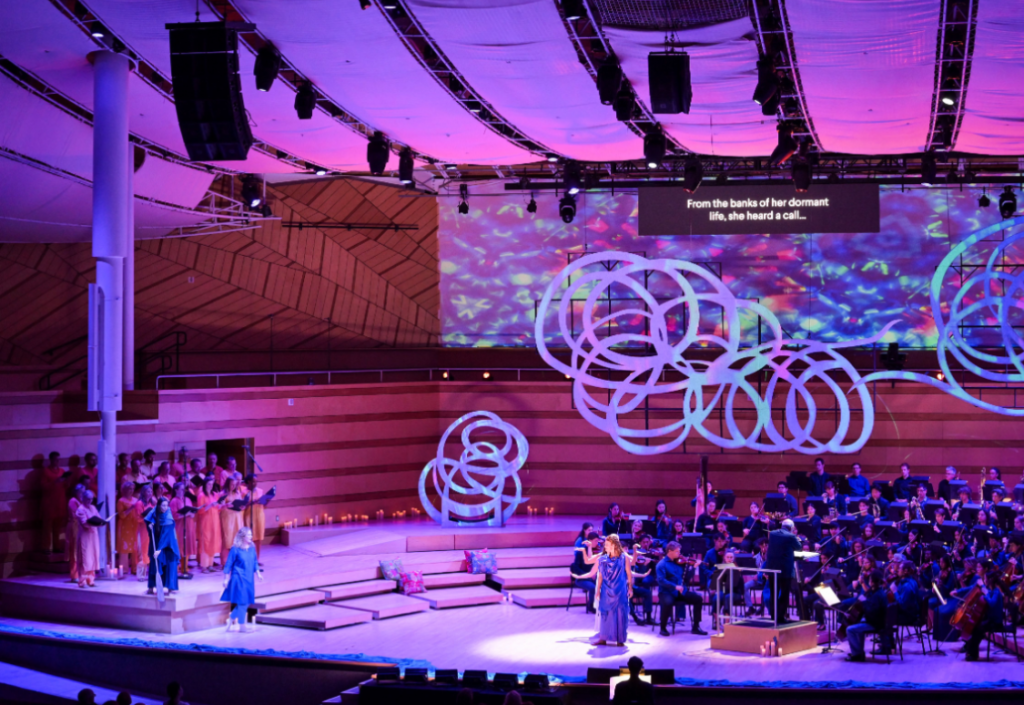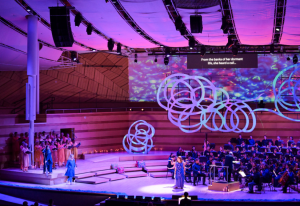World Premiere opera lights up the music tent

Diego Redel/Courtesy photo
Herman Hesse’s classic novel Siddhartha follows a man in ancient India who devotes his life to seeking spiritual enlightenment in unconventional ways. Saturday’s world premiere at the Aspen Music Festival of an operatic setting found some of its own revelations, not least by recasting the protagonist as a woman.
The ambitious undertaking surrounded the music of Christopher Theofanidis, who heads the composition program in the festival’s school, with dancers, video projections, and ambient background sounds of insects, birds and a river. As much as can be done semi-staged in a large tent.
A fine cast included some bona fide opera stars, among them the astounding countertenor Key’mon Murrah and mezzo-sopranos Tamara Mumford and Kelley O’Connor, all of whom also have done extensive work with contemporary opera. So has soprano Caitlin Lynch in the title role — on stage and singing for most of the 2 1/2-hour running time. Her well-rounded soprano sound underlined the character’s combination of humility and unwillingness to allow others to dictate how she should live her life.
The libretto by Melissa Studdard (the composer’s life partner and regular collaborator) follows the arc of Hesse’s novel. The protagonist leaves home in search of enlightenment, first rebelling against a strictly ascetic culture, then encountering the Buddha Gautama who finds enlightenment in love, and on to pursue and succumb to the courtesan Kamala, eventually finding deep connections in her soul with the whole world. As a woman, Siddhartha’s same-sex relationship with Kamala, and Studdard’s language and feminine approach put a different spin on the conversion.
Theofanidis’ music makes the story come to life, but it takes a while to finds its bearings. The first two scenes — leaving home, then dealing with the Samana ascetics — had such a harsh edge that I found it repelling. Maybe that was intentional, because it did illustrate Siddhartha’s difficulties, but the third scene turned everything around.
Murrah’s otherworldly high male voice, along with music that aimed for simplicity and refinement, created a hauntingly beautiful sound world. There was certainly the feeling that something better was in the air.
The music in the next scenes found a sort of exotic beauty. Riding with the ferry rower Dharuna, sung serenely by Mumford, Siddhartha is dumbstruck by the beautiful Kamala (played and sung with assurance by O’Connor). Intrigued, she woos her with poetry, but the lovers eventually part in a touching scene as each realizes that what they have is not really what they want for themselves.
The final scenes trace an awakening of spirituality that departs from rituals and requirements. In a final coda, Siddhartha’s father (played and sung humbly by baritone Nmon Ford) finds his daughter as he faces a sort of peaceful death. The music for all this may be some of the composer’s best.
Around all this are the sounds of prayer bells, a chorus of Buddhist devotees (the Denver-based Kantorei, who enter through the audience aisles, plus a few other singers dispersed among the audience who rise to sing from time to time), and a trio of women dancers dressed in flowing white gowns moving through almost every scene. (I am still trying to figure out what they were trying to convey.)
Holding all this together was the festival’s music director Robert Spano, who conducted the orchestra with impressive energy and shaped the music with precision. Assistant conductor Paul-Boris Kertsman was stationed at the foot of the stage to conduct the singers (who were not able to see Spano, since the orchestra was off to the side, not in front of them).
One big quibble for me was the sound system — not the soundscape of birds and crickets by soundscape composer Patrick Harlin but the amplification necessary for the singers. So much of the resonance of these wonderful voices was lost, especially when it got really loud.
In the end, though, the story and the music were what mattered most. In a season centered on music of spirituality, Siddhartha, She took the idea to a high level.
Sunday’s concert in the tent provided a platform for violinist Gil Shaham and the Bruch Concerto No.1 in G minor. The Festival Orchestra’s responsibilities being required for Siddhartha, She on Saturday night, the Aspen Conducting Academy Orchestra’s got the spotlight. Comprising all students (except for faculty concertmaster Ellen dePasquale), this orchestra usually plays Wednesday afternoons to provide student conductors a chance to work with a live orchestra.
With Spano on the podium, the ACA orchestra ably backed Shaham. As he often does, the soloist paid as much attention to the other instrumentalists as with the conductor. The results were just fine, especially in the concerto’s languid Adagio. A quicker tempo may have made the Allegro Energetico finale a bit more exciting, but the friendly vibe carried the day.
As an encore, Shaham made J.S. Bach’s Gavotte en Rondeau (from the Unaccompanied Partita No.3) dance amiably, complete with a few extravagant flourishes for further interest.
The opener, Missy Mazzoli’s ‘These Worlds in Us’, a nine-minute exploration of how we dredge up intense memories that can pivot from grief to joy and back again, dates from 2006. Mazzoli had just earned a master’s degree at Yale University’s school of music, making this an early example of her restless imagination for orchestral color and new twists in familiar music.
The second half of the concert contrasted with the decorum, and joy, of both the Mazzoli piece and Bruch’s concerto. Berlioz’s outsized Symphonie Fantastique let the orchestra pull out all the stops. Except for the middle movement (a tranquil country scene), subtleties fell by the wayside. Although the famous ‘march to the scaffold’ never quite freed itself to swagger as it might have done, the finale, which pictures a witches’ sabbath, finally took off, and it ended well.
Not to miss in coming days: Buckle up, it should be a good week, especially for piano fans: Lang Lang Tuesday in Harris Hall with a program of Schumann’s Kreisleriana and a raft of Chopin mazurkas, this year’s Cliburn winner Aristo Sham Thursday in Harris, and Jeremy Denk Friday in the tent with Anna Clyne’s new concerto for Piano and Orchestra. Jane Glover conducts the Chamber Symphony. And for a little Christmas in August, Glover also conducts Handel’s “Messiah” in Harris Hall Wednesday.
Harvey Steiman has been writing about the Aspen Music Festival for more than 30 years. His reviews appear in The Aspen Times Tuesdays and Saturdays.
Wildfire in Missouri Heights prompts evacuations, burns 115 acres as of Sunday night
A wildfire broke out Sunday near Missouri Heights that prompted temporary evacuations and burned an estimated 115 acres, although no injuries or major structural damage were reported.









